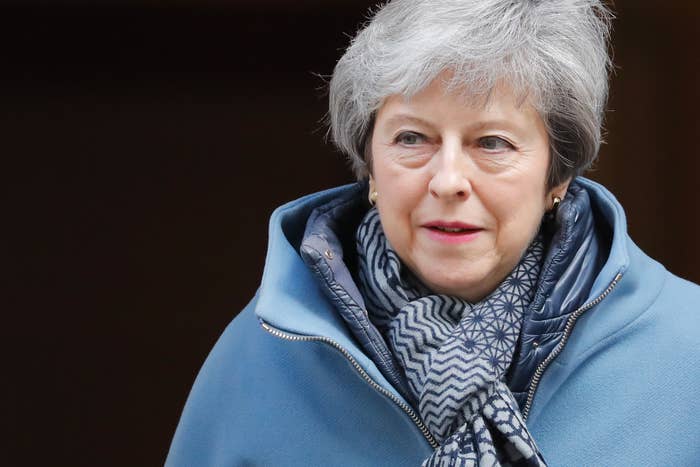
EU leaders are unlikely to grant a short delay to the Brexit process unless British MPs approve the withdrawal agreement before the 27 leaders meet in Brussels next week, senior EU officials have told BuzzFeed News.
In a speech on Tuesday, Theresa May laid out plans to seek another short extension to Article 50 – the framework that sets out the two-year process for the UK’s departure from the EU initially set for March 29.
May will now enter into talks with the Labour party, suggesting for the first time that she could be willing to shift on her so-called red lines.
The aim of the sit-down with Jeremy Corbyn is to find a way out of the impasse the country finds itself in after the prime minister's Brexit deal was rejected by parliament on three occasions. Separately, MPs have also failed to agree any alternative solutions to break the deadlock.
When EU leaders met at a European Council summit meeting last month, the 27 heads of state and government agreed to extend Article 50 until May 22 on the condition that MPs approved the withdrawal agreement, the legally-binding terms of Britain's departure from the EU. If they don't approve it, the UK has until April 12 to put forward another plan or face crashing out without a deal.
EU and European government officials are adamant that if the deal doesn’t go through, and the UK asks for a longer extension before the April deadline, Britain will have to hold European Parliament elections in May. The cut-off date for the elections is April 11.
“It appears that some forgot why the 22 May extension was made conditional on the approval of the withdrawal agreement,” a senior EU official told BuzzFeed News. “Leaders were very determined to avoid the risk of a no-deal Brexit on the eve of the European Parliament elections,” the official added.
On Wednesday, the president of European Commission, Jean-Claude Juncker, told MEPs that 12 April was the "ultimate deadline" for the House of Commons to approve the deal – and no further short extension would be possible if MPs had not done so by that date.
.@JunckerEU 🇪🇺🇬🇧 “12 April is the ultimate deadline for approval of the #WithdrawalAgreement by @HouseofCommons. If it has not done so by then, no further short extension will be possible. After 12 April, we risk jeopardising #EUelections2019 and threaten functioning of #EU.”
EU27 ambassadors were told last week that without the withdrawal agreement, the UK had only two choices: no deal or a long extension.
In the event of a long extension the “UK must organise European Parliament elections and say so on 10 April,” said the EU official, adding: “we will freeze negotiations until the end of year until the UK agrees on the withdrawal agreement with an amended political declaration, possibly after a general election or a referendum.”
The same official indicated that a long extension could last to the end of March 2020.
The decision on whether to grant an extension and its terms will ultimately be one for EU leaders when they meet next week. Throughout the Brexit process, however, the 27 have tended to take a tougher stance than officials and negotiators in Brussels,” diplomats previously told BuzzFeed News.
French President Emmanuel Macron said on Tuesday that a long extension should not be taken as a given.
“If the UK cannot come up with a solution supported by a majority, it will in effect be choosing to leave without an agreement,” he said.
Brexit : si le Royaume-Uni n'arrive pas à trouver une solution qui réunit une majorité, il aura de facto choisi de lui-même de sortir sans accord. Nous ne pouvons pas éviter l'échec à sa place.
Although the EU has repeatedly said that the withdrawal agreement cannot be renegotiated, it has indicated that, should May move on her red lines, it would be open to changes to the political declaration, the non-binding element of the Brexit package that outlines a framework for the future UK-EU relationship.
This could include changes to the backstop — the insurance policy that ensures that the border in Ireland remains open under all circumstances.
The EU27 ambassadors were also told last week that should there be a no deal, the EU would set the UK preconditions on financial commitments, the rights of EU citizens, as well as find a solution that keeps open the border in Northern Ireland to enter trade talks. In effect, Britain would be asked to sign up to terms very similar to those contained in the Brexit agreement.
In a speech last night, May said that she would seek a “short as possible” extension that “ends when we pass a deal".
She added: “We would want to agree a timetable for this Bill to ensure it is passed before May 22 so that the United Kingdom need not take part in European Parliamentary Elections.”
The UK government has begun taking the necessary steps to hold EU elections if need be, a sign that it would prefer a long extension to exiting the EU without an agreement.
Any attempt by May to agree a customs union with Corbyn, or a long delay to Brexit, is likely to anger her MPs. Only 36 Conservative MPs voted in favour of the arrangement in an indicative vote this week, while 236 opposed the measure.
